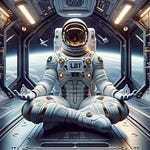Sir Arthur C. Clarke, a pioneer in both science fiction and scientific thought, offered profound insights into the future of humanity, technology, and exploration. His predictions, while often far-reaching, were grounded in an understanding of technological potential and human adaptability.
Clarke emphasized that predicting the future is inherently challenging and often paradoxical. He observed, "If predictions sound reasonable, they may soon appear conservative due to rapid progress. Conversely, if they seem absurd, they might just be ahead of their time." This perspective underscores the difficulty and excitement of forecasting what lies ahead.
One of Clarke's most iconic works, 2001: A Space Odyssey, not only explored the possibilities of artificial intelligence and space exploration but also ignited global discussions on the implications of technological autonomy. Created in 1968, the film remains a masterpiece of speculative thought and a reflection on humanity's relationship with machines.
The City and Communication in the Future
Clarke envisioned a future where cities, as central hubs for human interaction, might lose their traditional roles due to advancements in communication technologies. With innovations like satellites and transistors, he predicted a world where individuals could collaborate and work from virtually anywhere—decades before the advent of remote work and digital connectivity.
"People will no longer commute; they will communicate," Clarke declared. He foresaw a future where professionals could operate seamlessly from remote locations, such as Tahiti or Bali, without compromising productivity—a concept that resonates strongly in today’s era of globalized virtual work.
Machines and Evolution
Delving into the potential of machines, Clarke predicted that computers would evolve from basic tools into entities capable of surpassing human intelligence. While today's AI systems remain tools, their capabilities in problem-solving, learning, and creativity affirm Clarke’s vision of machines becoming integral collaborators in human progress.
He also speculated on the concept of "bioengineering," suggesting that humanity could cultivate intelligent animals like dolphins and chimpanzees for specialized tasks—a fascinating idea reflecting the interplay between biology and technology.
Space Exploration and Beyond
Clarke passionately advocated for humanity's expansion beyond Earth, envisioning a time when individuals might live on the Moon or terraform other planets to make them habitable. He viewed space exploration as not just a scientific endeavor but a necessity for discovering intelligent life and ensuring the survival of humanity.
To facilitate long-term space travel, Clarke proposed concepts such as suspended animation, where humans could be frozen for interstellar journeys. He even speculated on the eventuality of immortality, highlighting humanity's relentless drive to overcome physical and temporal limitations.
The Replicator: The Invention to End All Inventions
One of Clarke’s more speculative ideas was the "replicator," a device capable of duplicating any object with precision. While this remains a science fiction concept, it highlights the transformative potential of automation and abundance—a world where scarcity could become obsolete. Clarke cautioned, however, that such an invention would challenge societal norms, raising questions about adaptation and ethical use.
Endless Fascination with the Future
For Clarke, the allure of the future lay in its unpredictability. He believed that humanity's ingenuity would continue to redefine life, surpassing our wildest imaginations. "The future," he stated, "is not just an extension of the present; it is a leap into the fundamentally different."
Clarke’s legacy endures as a testament to the power of curiosity and the boundless possibilities of innovation. His work inspires us to embrace change, think boldly, and strive for a future that is as extraordinary as it is uncertain.






Share this post